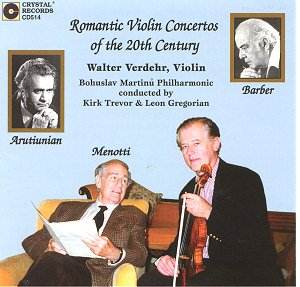ROMANTIC VIOLIN CONCERTOS OF THE TWENTIETH
CENTURY
GIAN CARLO MENOTTI Violin Concerto
28:17
ALEXANDER ARUTIUNIAN Violin Concerto
23:53
SAMUEL BARBER Violin Concerto
23:13
 Bohuslav Martinu PO/Kirk Trevor
(Menotti; Arutiunian) and Leon Gregorian
(Barber)
Bohuslav Martinu PO/Kirk Trevor
(Menotti; Arutiunian) and Leon Gregorian
(Barber)
 CRYSTAL RECORDS CD514
[75.41]
CRYSTAL RECORDS CD514
[75.41]

The Menotti concerto is intense and smoothly flowing. In its operatic romantic
modernism it shadows the Barber concerto. In Verdehr's hands the 'lungs'
of the work breathe more naturally than in the flaming intensity of the
pioneering Spivakovsky LP recording (RCA Boston SO/Munch). The approach and
the sound quality are leaner than the Ricci disc (Reference Recordings RR-45CD)
which remains my first choice. If the Menotti misses (not by a mile) the
melodic memorability of the Barber or the Janis Ivanovs concertos it remains
a work you need to hear if you have any feeling for works that stand in
hereditary line to the Tchaikovsky.
Succulently reflective nostalgia is the hallmark of Ricci's Barber. Verdehr
(23:13) is alive to these qualities but does not surrender to them with the
abandon of Ricci (25:47). This is a strength although the performance sometimes
slips into a low-key approach. The Ricci, while compellingly rich, is a nice
antidote to the Isaac Stern (CBS-Sony). The Verdehr is lean and fleetly bowed
without the breathlessly driven quality of the Stern.
Reference Recordings neatly couples the Barber and Menotti. Crystal do not
stint including a third concerto in four movements. Arutiunian (b. 1920)
may well be known better for his trumpet concerto. He was born and educated
in Yerevan then studied in Moscow from 1946 to 1948. As an Armenian composer
he is naturally measured against Khachaturyan. His concerto is one of several.
Apart from the famous trumpet concerto there are concertos for piano and
for female voice. This one dates from 1988. Verhdehr's playing is once more
clean and clear. He is not given to adorning the line in any way. The concerto
is touched with romance which falls somewhere between Khachaturyan and
Shostakovich. This is mingled with the neo-baroque approach of Schnittke.
It ends in mid air as if the composer suddenly said 'time to stop'.
I was much taken with this unhackneyed and generous anthology and I hope
that you will be too
Reviewer
Rob Barnett

